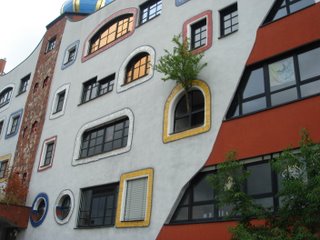
Wittenberg.
Berlin, so close (only 80 more kilometers!) and yet...
Have to stay a day here in Wittenberg to see why it is a UNESCO World Heritage site (in spite of my hurry to get to Berlin, the culmination and northernmost point of the trip, the halfway point, the city I have heard so much of, of rich history, of fantastic museums and excellent music, well, I should stop gushing and get back to telling you about Wittenberg).
So I went in the morning and droped by the Haus der Geschichte which deals primarily with how Wittenberg was during the GDR times, and was all furnished in 60's and 70's type furniture. It was exactly like walking into the set of the movie "Goodbye Lenin!", complete with the cans of those pickles that the young man in the story is constantly looking for to give to his mother. Very strange.
Anyway, later I headed over to the Lutherhalle (Luther Museum) which is at the house in the Augustinian monastery where Luther lived first as a monk and later with his wife while he was teaching at the university, and which he made available to students and friends for guest staying and general discussion.
But before I tell you about the excellent exhibits there (they are much better than at any of the other Luther places I visited here in Germany, having been renovated and spruced up to the tune of something like 2.5 million Euros back in 2003), did you know why Martin Luther became a monk in the first place?
No?
There was a thunderstorm, he freaked out, and scared to death he prayed and promised to St. Anne that he would become a monk if saved.
"No atheists in foxholes", the old saying goes, ha ha.
How ironic, too, considering that later Luther rejects all Saints since, according to the new Luther reformation views, the veneration of Saints violates the 1st commandment of Jesus Christ as the only path to salvation.
But I'm getting ahead of myself again. Let me start from the beginning.
If you for a moment take a Christian mindset, and look over his 95 theses, they seem quite reasonable (gosh am I turning Protestant now? That would be the last straw, wouldn't it? ;P), written justly by someone who obviously takes the matter seriously, sees the absurdity and hypocrisy in the whole practice of indulgences, and questions authority. Very commendable.
But, did you know, that indulgences, in reality, though marketed as "pardons for the sinners" and sold to the poor supposedly to help fund the construction of St. Peter's in Rome for the greater glory of God (which is what Luther was questioning), were actually being used for paying the debts of the Archbishop of Magdeburg, Albrecht von Hohenzollern, which was the fee he had to pay Rome for the accumulation of religious offices and titles (Hohenzollern had also acquired the arch-bishopy of Mainz)?
Luther, apparently (according to documentation in the exhibit, at any rate), didn't know this at the time of the 95 theses. So here we have a great thinker acting in good faith but also being terribly naive, for the "wickedness" and "ignorance" he was condemning in his writings was far, far cleverer and insidious than he could've possibly imagined. And see, how it is the story of humanity, that the powerful take advantage of the uneducated sheep (the people who fearfully buy indulgences in this case) and use the educated, the naive, but educated (like Luther and his monks) as pawns to suit their purposes?
Aye.
The ordinary citizen needs to learn to see, where what is sold to him as "humanitarian", or "the war for peace", or "making the world safe for democracy", or "final solutions", or "getting rid of evil" or any other of such blathering nonsense is actually going. Remember what I said about why critical thinking skills are important?
Anyway, moving on. This exhibit did a good job, too, about showing the not so good aspects of Luther's work and character. Luther did many very good remarkable things, but he was a man, and did many terrible things also. Take, for instance, the peasant revolts of 1525. Luther sides with the princes, results in Münzer's (German pastor and peasant rebel leader) decapitation, in spite of seeming to support them at the beginning. Or take his anti-Turk and anti-semite pamphlets of 1538, where among other things he said that their mosques, synagogues, and schools should be burned and that their houses should be crushed and destroyed as well, and which, wasting no time, were even used as inspirations for the well documented World War II disasters, and which even prompted, in 1983, an apology from the Luther World Federation (text transcription from exhibit quote):
"We neither approve nor excuse...the awful anti-semitic writings of the Reformer...we find with great regret that Luther's name had to be brought in during the Nazi period to justify anti-semitism, and that his writings are suited for such abuse."
But not just the Nazis, then the GDR. According to the exhibit, while in West Germany the Luther celebrations were uncertain and with some embarasment, in East Germany Luther was touted as a "bourgeois revolutionary" in view of his role in the peasant revolts (I assume while he apparently supported them, nevermind that he did not support them when they turned exciting later) and the reformation, so he's a hero according to Soviet thought.
The perils of being famous/changing the world: your message, inevitably, will be bastardized and prostituted to suit the aims of the ruling classes.
No doubt, though, that a good chunk of Luther's writings should be a worthwhile, edifying/insightful read.
Still, in 1982, Gerhard Ebeling (Protestant theologician) said:
"Measured against this [Luther's understanding of freedom in his biblical theology], today's enthusiasm for Luther is suspected of ignorance concerning the strangeness of Luther."
Interesting parting words to the exhibit, they kept me company for the rest of the day.
Oh, the picture at the top of the post? A Wittenberg High School (the Martin-Luther Gymnasium), designed by architect Friedensreich Hundertwasser. He's like a way much, much cooler Gaudi. Wished he had designed some of the buildings at MIT. A dorm by him would've been nice. :)

No comments:
Post a Comment